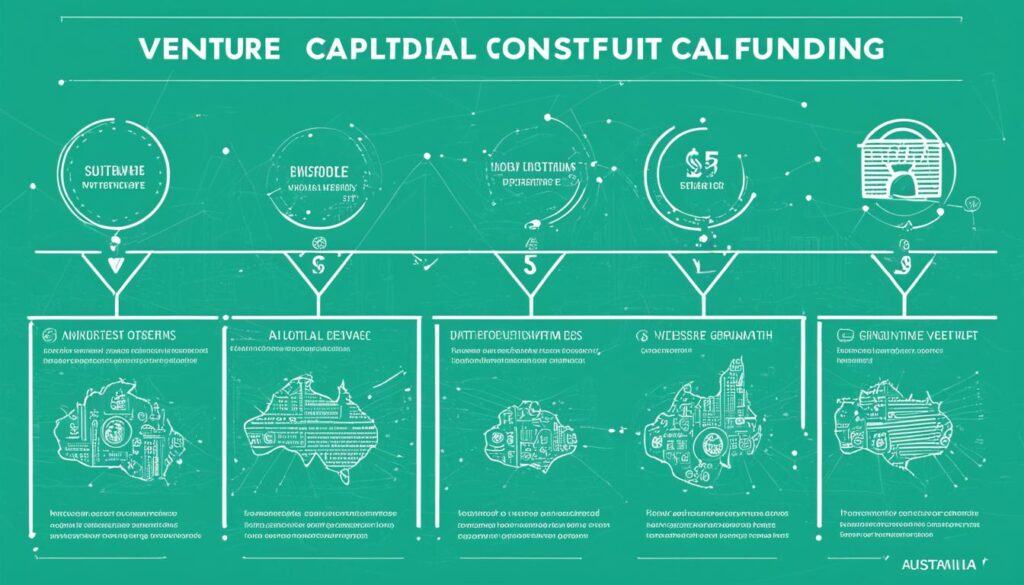In the world of business, venture capital has played a pivotal role in driving innovation and shaping the trajectory of many successful companies. From the tech giants of Silicon Valley to the rising stars of the Australian startup ecosystem, venture capital has been the lifeblood that has nurtured and propelled these enterprises to new heights. But how exactly does this unique form of financing operate within the Australian landscape? Prepare to uncover the inner workings of venture capital and its transformative impact on the country’s entrepreneurial ecosystem.
Key Takeaways
- Venture capital is a crucial source of funding for innovative and high-risk startups in Australia.
- Venture capitalists provide not only financial backing but also valuable expertise, guidance, and access to their extensive networks.
- The Australian venture capital landscape has seen significant growth in recent years, with a thriving ecosystem of active firms and increasing investment activity.
- Understanding the venture capital investment process and the various funding stages is key for entrepreneurs seeking to secure this type of financing.
- Selecting the right venture capitalist is crucial, as it can greatly impact the long-term success and growth of a startup.
Introduction to Venture Capital
Venture capital is a modern variation on a long-established practice of pooling money to finance risky ventures. It is defined as ‘high risk private equity capital for typically new, innovative or fast growing unlisted companies’. Venture capitalists can be either professional venture capital firms or ‘business angels’ – wealthy individuals with particular niche interests.
Definition and Purpose
Businesses financed by venture capital are often engaged in speculative ventures and cannot obtain finance from traditional sources. Venture capital allows an idea or intellectual property to be taken from its conception through to proof-of-concept and commercialization. It is an important vehicle for financing new and innovative high-risk, high-return ventures.
Importance in Fostering Innovation
Venture capital plays a crucial role in supporting and fostering innovation, which drives improvements in productivity and living standards. By providing financing to new and innovative companies that may not have access to traditional sources of funding, venture capital enables the development and commercialization of transformative ideas and technologies. This helps to spur economic growth and progress across a range of industries.

Venture Capital Landscape in Australia
The Australian venture capital landscape has seen significant growth and evolution in recent years. According to data from the government’s Department of Industry, Science and Resources, the country currently has around 130 active venture capital firms that have committed approximately $30 billion of capital since the introduction of the Venture Capital Act in 2002.
Number of Active Venture Capital Firms
The local VC industry in Australia has expanded considerably, with the number of active firms serving as a testament to the growing appetite for investment in innovative startups and high-growth companies. This vibrant ecosystem is fostering an environment conducive to the development of the australian venture capital landscape and providing crucial funding support to vc firms in australia.
Capital Raised and Deployed
The Australian venture capital industry reached a high point in 2021, raising and deploying more than $2 billion that year. However, similar to the global trend, the market has since reduced in size quite substantially in terms of venture capital raised australia and venture capital deployed australia. Despite this recent dip, the country’s VC landscape remains robust, with prominent firms such as Square Peg, Airtree, Blackbird, Telstra Ventures and Brandon Capital continuing to drive innovation and growth.

How Does Venture Capital Work in Australia?
The venture capital investment process in Australia follows a structured approach. It begins with the venture capitalist conducting an initial review of the proposal to determine if it fits with the firm’s investment criteria. If so, a meeting will be arranged with the entrepreneur/management team to discuss the venture capital due diligence on the business plan.
Investment Process
The initial meeting provides an opportunity for the venture capitalist to meet the entrepreneur and key members of the management team to review the business plan and conduct initial due diligence on the project. If the business plan fits with the firm’s investment criteria and it is satisfied by the management team, the VC will look to establish terms of the memorandum of understanding with the business. It will also undertake more exhaustive review of the industry and the market segments.
Negotiating Investment
Once the VC firm is satisfied that the business case is promising, it will offer capital in exchange for an equity stake. Final venture capital deal negotiation terms are then negotiated and an investment proposal submitted to the board of directors.
Approvals and Investment Completed
If approved, legal documents such as a shareholders’ agreement are prepared containing the rights and obligations of each party. The venture capital approval and investment process generally can take up to three months or longer.

Selecting the Right Venture Capitalist
When it comes to securing venture capital funding, the selection of the right venture capitalist is crucial. Entrepreneurs must thoroughly research the investment preferences of various VC firms before making a decision. Often, these firms have specific preferences for particular stages of investment, industry sectors, geographical locations, and investment amounts.
Investment Preferences
Understanding the vc investment preferences australia is the first step in choosing the right venture capitalist. Some firms may focus on seed-stage startups, while others specialize in Series A or B rounds. Certain VCs may have a predilection for specific industries, such as technology or healthcare, while others maintain a more diversified portfolio. Geographical preferences, such as a focus on local or international markets, can also play a role.
Building a Good Working Relationship
Given the long-term nature of venture capital investments, typically 4-6 years, it is essential for entrepreneurs to select venture capitalists with whom they can establish a strong working relationship. This collaborative partnership allows the startup to benefit from the VC’s industry expertise, strategic guidance, and access to valuable networks and resources.
Additional Value Beyond Funding
When building vc relationship, entrepreneurs should consider the value beyond funding from venture capital that a particular VC can provide. This may include industry-specific knowledge, fundraising support, financial and strategic planning, assistance with recruiting key personnel, guidance on mergers and acquisitions, and facilitation of international market expansion.

Legal Considerations
When securing venture capital financing in Australia, it is common for a comprehensive shareholders’ agreement to be prepared. This agreement outlines the
rights and obligations
of each party involved, including the venture capitalist and the founders or existing shareholders of the company.
Shareholders’ Agreement
The shareholders’ agreement typically covers a wide range of important details, such as the amount and terms of investment, the dividend policy, the composition of the board of directors, and the reporting requirements. It also addresses liquidity (exit) plans, rights of co-sale, warranties, and the matters requiring venture capitalist approval (e.g., auditors, employment contracts, major asset purchases, significant variations of plans).
Rights and Obligations
The legal terms venture capital australia outlined in the shareholders’ agreement ensure a clear understanding of the rights and obligations venture capital between the various stakeholders. This helps to establish a productive working relationship and align the interests of the founders, management team, and the shareholders agreement venture capital provider(s).

| Key Provisions in Shareholders’ Agreement | Description |
|---|---|
| Investment Amount and Terms | Details of the capital injection by the venture capitalist, including the size of the investment and the equity stake acquired. |
| Dividend Policy | Guidelines for the distribution of profits and any restrictions on dividend payments. |
| Board Composition | Representation of the venture capitalist on the company’s board of directors. |
| Reporting Requirements | Periodic financial and operational reporting obligations of the company to the venture capitalist. |
| Liquidity and Exit Plans | Arrangements for the venture capitalist to sell their equity stake, such as through an IPO or trade sale. |
| Co-Sale Rights | |
| Approvals Required | Decisions and actions that require the venture capitalist’s consent, such as major business decisions and key personnel changes. |
Venture Capital Funding Stages
Venture capital financing is classified according to the various stages of a business. Seed Capital is the first official capital raised to help a start-up finance its first steps such as market research and product development. Series A funding is raised to further the development of the business’ product or service offerings. Series B funding is used to take the business to the next level, deploying capital to grow the company so it can meet new levels of demand or open in new markets. Series C & D funding are larger capital amounts deployed when the business has already proven its potential to drive more accelerated growth, often used to boost a company’s valuation prior to an IPO.

The various stages of venture capital funding in Australia are crucial for start-ups and early-stage companies to secure the necessary resources to grow and scale their operations. From the initial seed capital to the later-stage series A, B, C and D funding, each round serves a specific purpose in the company’s development, allowing entrepreneurs to navigate the challenges of building a successful and sustainable business.
Advantages of Venture Capital
Venture capital offers numerous advantages over other forms of financing for businesses in Australia. One of the primary benefits is the long-term equity financing provided by venture capitalists, which gives companies a solid capital base to fund future growth and expansion. Venture capitalists are not just passive investors, but rather true business partners, sharing both the risks and rewards of the venture.
Mentoring and Guidance
Beyond the capital injection, venture capitalists can provide invaluable mentoring and guidance to the companies they invest in. Leveraging their experience with other similar companies, they can offer strategic, operational and financial advice to help navigate challenges and seize opportunities.
Access to Networks and Resources
Venture capitalists also have extensive networks and resources that can benefit the companies they back. This includes connections for recruiting key personnel, accessing international markets, forging strategic partnerships, and securing additional rounds of financing as the business grows.
Facilitation of Exit Strategies
Importantly, venture capitalists are well-versed in the process of preparing a company for an initial public offering (IPO) or facilitating a lucrative trade sale. This expertise can be invaluable when the time comes for the founders to realize their investment.
Overall, the advantages of venture capital in Australia extend well beyond just the financial capital provided. The strategic guidance, industry connections, and exit planning capabilities of venture capitalists can be transformative for high-growth companies seeking to scale and succeed.

Venture Capital vs. Other Funding Sources
When it comes to financing new and innovative ventures, entrepreneurs have several options to consider, each with its own unique characteristics and implications. Two key distinctions in the funding landscape are the differences between venture capital and private equity, as well as between angel investors and venture capitalists.
Private Equity vs. Venture Capital
Private equity broadly refers to investment and control in a company that is not publicly listed or traded. Typically, private equity firms buy-out or purchase majority stakes in companies, effectively gaining control over the business and its decision-making. On the other hand, venture capital is actually a subset of Private Equity, involving specifically investing in startups and early-stage companies using funds from private investors.
Angel Investors vs. Venture Capital
Angel investors are typically high net-worth individuals who invest their own money in start-up businesses, while venture capitalists tend to be funds or investment companies that have pooled together money from their investors. Angel investors tend to finance early-stage companies, while VCs invest in both early-stage as well as later-stage high-growth businesses.
The key differences between VC and other funding sources lie in the level of involvement, the stage of the business lifecycle, and the overall investment approach. Understanding these distinctions can help entrepreneurs make informed decisions about the most suitable funding option for their venture.

Conclusion
Venture capital is an important contributor to many of the innovations that drive improvements in productivity and living standards in Australia. While its size relative to the economy is typical for an OECD country, Australia’s total venture capital investment is relatively smaller than that of the United States. The US, however, has a number of regions or ‘clusters’ with very high levels of venture capital activity, such as Silicon Valley and Boston, which benefit from a combination of favorable circumstances and historical developments.
There appears to be no right way to develop a successful venture capital cluster, and no magic formula. Nonetheless, venture capital has played a key role in helping create and grow many innovative firms in Australia. The conclusion on venture capital in Australia is that while it may not be as robust as in the US, it has been an important engine for innovation and growth in the country.
As the venture capital landscape in Australia continues to evolve, it will be important for policymakers and industry stakeholders to identify ways to further strengthen this critical source of funding for startups and high-growth companies. By fostering a more vibrant venture capital ecosystem, Australia can unlock even greater levels of innovation and economic progress in the years to come.
